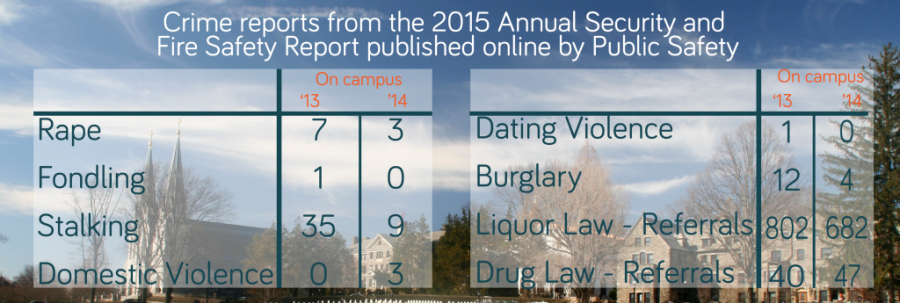Survey goes out, but students don’t see the point
October 27, 2015
On the evening of Wednesday, Oct. 21, Villanova students received an email containing the link to a climate survey open to all undergraduates. “Your Voice is Important!” decreed the subject line; “We are inviting ALL Villanova students to participate in a survey regarding student perspectives and experiences of the Villanova campus climate in general as well as sexual violence as a particular area of concern.”
Students received a message one day earlier from Rev. Peter M. Donohue, O.S.A., Ph.D. encouraging their contribution; “By participating in this survey, you will be providing critical insights to help protect and support all Villanova students. The survey feedback will be used to develop and improve Villanova’s response and resources related to sexual violence.”
Ryan Rost, who will be transitioning from Assistant Dean of Students to the position of full-time Title IX Coordinator, spoke to the survey’s objective. “It’s been an issue on college campuses for years, but it’s becoming a lot more prevalent and we want to really do everything we can to support our students,” Rost said. “The climate survey is really intended to get as much feedback as we can from students.” This includes personal experiences, but is not limited to victims of sexual assault.
Statistics reflect that sexual violence annually affects 20 percent of women and six percent of men on college campuses. According to the 2015 Annual Security and Fire Safety Report, there were seven counts of on-campus rape reported in 2013, and three reported in 2014.
“Under-reporting is a huge issue with sexual violence and sexual assault, particularly given the gender expectations around it,” said Melissa Hodges an Assistant Professor in Villanova’s Department of Sociology and Criminology specializing in the sociology of gender. “That is something that I’m really hoping that the survey might get at.”
Separate categories in the annual report show statistics for statutory rape, fondling, domestic violence, dating violence and stalking. The genders of victim and offender are not specified in this report.
In an email sent to his classmates urging their participation, Senior Kevin Madden wrote, “PARTICIPATION IS ESSENTIAL for this survey to provide an accurate reflection of how the Villanova community experiences incidents of sexual assault/violence.”
A survey of this nature benefits from as much participation as possible, with sample size contributing largely to the margin of error. “If you can get a margin of error within three percent, that’s pretty good,” Hodges said. “Even five [percent] can be acceptable. You do sometimes get response bias, where people will essentially answer the questions how they think would be more socially acceptable.”
Many students remain skeptical about their ability to contribute at all.
“The social groups and situations I’m in don’t really involve that as an issue,” said one student.
“I don’t think I’d give a valid assessment,” said freshman Caroline Nelson. “I just don’t know much about the topic.”
Senior Mike Tattory echoed these sentiments. “Sexual assault, in my college experience, hasn’t been a big thing. But I think it’s definitely applicable to any school with a high presence of alcohol and partying.”
A member of Greek Life, Tattory spoke to the research linking campus sexual assault with Fraternities. “I think it’s fair,” he said. “Not because of incidents that happen, I think the targeting is a result of fraternities drinking more frequently. I think that’s totally reasonable. I’ve seen situations that were definitely going in that direction.” In every case, however, these situations were “diffused or dissipated.”
Many disregarded the email, or only vaguely recalled seeing it. “I actually thought it was an environmental thing, like climate change or something,” admitted one student, who read only the subject line.
“I feel like it’s important, but its not my top priority,” said Mansi, a freshman.
Junior Kinjal Dave voiced a different opinion. “I think it’s a massive problem that we don’t really talk about at Villanova. More broadly, I think there’s an idea that you almost expect to engage in unwanted sex, it’s just a thing that happens at college.”
“I think the thing that is on my mind is the idea of hookup culture on campus,” said junior Gabriella Berman. “We’re attacking on the surface a sexual assault issue… but that [hookup culture] isn’t talked about at all.”
Sitting across the table Katie Stepanek, also a junior, agreed: “I think that’s an underlying issue that’s a big part of it,” she said.
Hodges also commented on hookup culture, saying, “It’s important to think about hookup culture as actually a move forward in some ways, because women are feeling liberated enough to take control of their own sexuality in many ways.” These liberated situations can also lead to undesired outcomes, however. According to Hodges, “This is what the research shows; when you have parties where…young adults get together, and there’s not a lot of room for conversation, and it’s more about heavily dancing and drinking, that is when you get higher rates of sexual assault.”
Several students feel the survey may have been overshadowed by other campus news, the decision to transition Villanova’s Public Safety to armed Campus Police. This announcement was also detailed in an email from Father Peter Donahue just days earlier, and was met by a student protest held Friday, Oct. 23.
“I could see why more people would have an opinion about arming public safety than sexual assault,” said freshman Carolina Bunge.
“I think it’s a lot to be sending out at once,” agreed freshman Maddy Ostrom.


